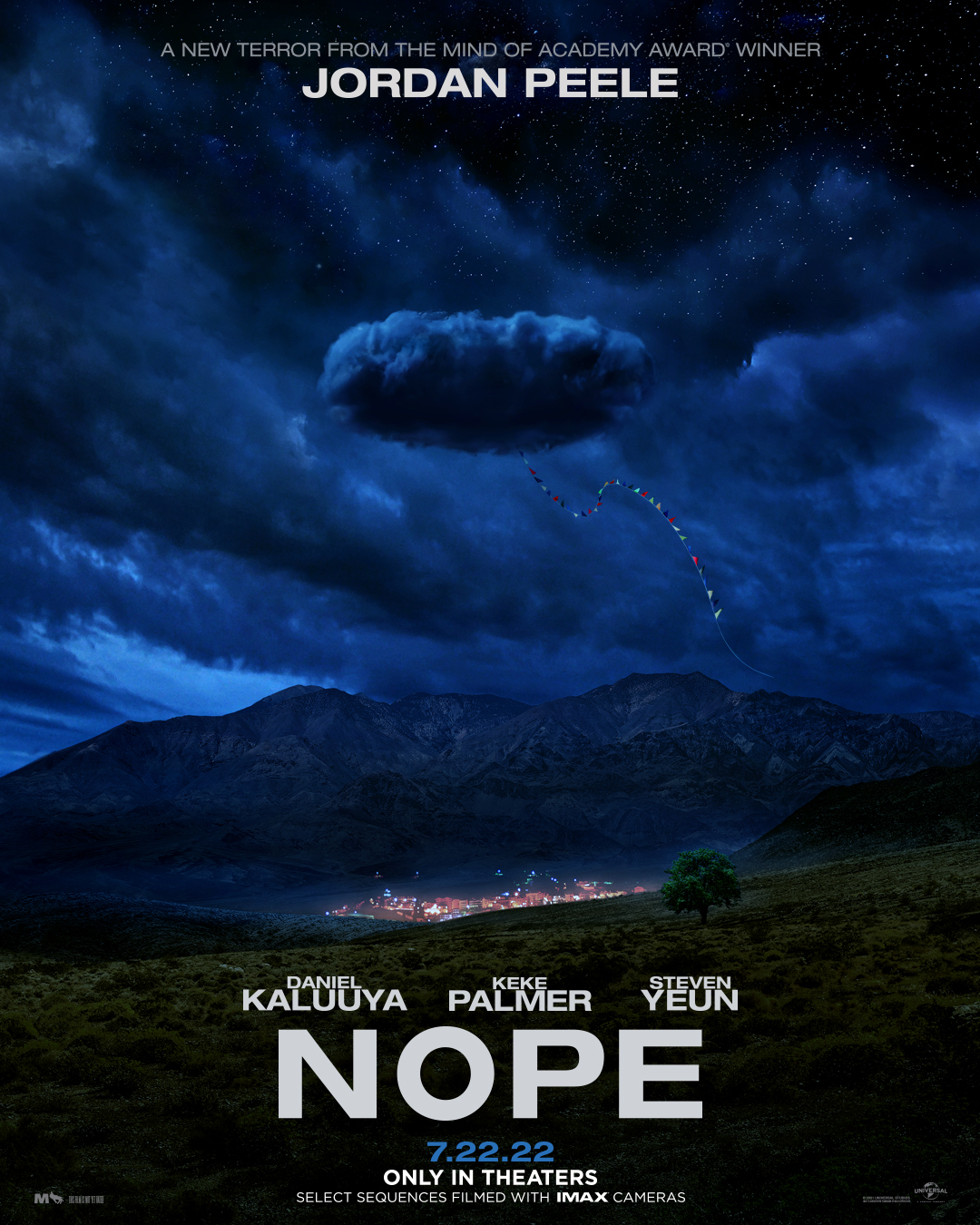
22 Jul Nope Review
NOPE
dir. Jordan Peele, starring Daniel Kaluuya, Keke Palmer, and Steven Yuen
Nope, a dark pop nightmare of uncanny science fiction and complex social thriller that unpacks the seeds of violence, risk and opportunism that are inseparable from the romanticized history of the American West, and from show business itself, is the third movie from writer/director Jordan Peele.
Nope is situated just outside of Los Angeles, in Southern California’s arid and rambling Santa Clarita Valley, where siblings OJ Haywood (Kaluuya) and Emerald Haywood (Palmer), have inherited a horse ranch from their industry-legend father, Otis Haywood Sr. carrying the torch of his craft as animal wranglers for film and television. It’s a tough business, and despite their skills and the artistry of their profession, OJ and Emerald face financial challenges and the heartbreak inherent to a trade where livestock is the talent. Adjacent to the Haywood ranch sits Jupiter’s Claim, a family-fun theme park and petting zoo predicated on the white-washed history and aesthetics of the California Gold Rush, owned and operated with evangelical pride by Ricky “Jupe” Park (Yeun), a former child star who is saddled with a tabloid-tragic backstory that he has spent a lifetime trying to escape.
OJ and Emerald begin observing unexplained phenomena on their vast ranch that leads them down an obsessive rabbit hole—plotting attempts to capture the mystery on camera. The hijinks of their quest for documentation, through increasingly elaborate and dangerous set-ups, puts at risk the only thing they truly have: the hard-earned business of their late John Henry-esque father, who has left them in his long shadow. Things escalate, as the siblings enlist the expert help of Fry’s Electronics store employee Angel, and acclaimed cinematographer Antlers Holst, who is on the cusp of retirement. As their efforts, and hubris, cross a point-of-no-return, ratcheting the stakes to terrifying consequences, our heroes are drawn straight into the eye of an irreversible storm. The result is an expansive horror-spectacle with an intimate and emotionally complex core.
Daniel Kaluuya and Jordan Peele are quickly becoming a teamup for the ages. A complete 180 from his likeable, affable everyman in Get Out, here in Nope Kaluuya barely speaks. A stoic man who only talks when necessary, Kaluuya plays OJ Haywood as a man who doesn’t say anything not worth saying. A man of drive and purpose, OJ’s determination on always moving forward is one of the main drives of the story. Proving that his Academy Award winning turn in Judas and the Black Messiah wasn’t a fluke, Kaluuya’s turn here in Nope rivals and possibly surpasses that of Chris Washington from Get Out.
Even though Kaluuya is the Robert DeNiro to Peele’s Scorsese, and hopefully a combination that lasts far into the future, it’s Keke Palmer that steals the show. Every scene she’s in, it’s almost impossible to focus on anyone else. Exploding into the film with a charm and charisma that’s off the charts, Palmer’s performance quiets drastically once things get serious, but she somehow never loses her charm or playful mischievous nature. If Nope doesn’t turn Palmer into a bona fide movie star, nothing will.
Also starring Steven Yuen as Ricky Park, a former child actor and owner of a carnival, the Walking Dead actor continues his hot streak of brilliant decision making in working with Jordan Peele. As the carnival owner trying to capitalize on the appearance of the film’s antagonist, Ricky is a clear condemnation of spectacle over substance. A character with a deeply traumatic past as a child actor, Ricky’s past is touched upon a few times (and definitely the film’s most upsetting scene) but never fully explored. While there’s hints and theories online, the scenes of Ricky’s past and how they tie into the main story might be the film’s biggest conundrum and also its weakest part. Still, for the brief amount of time Yuen is on screen, his charm is undeniable while interacting with both OJ and Emerald as well as his audience.
As writer/director Jordan Peele’s third feature length film, Nope proves that he’s grown into a man fully in command of his abilities. At 131 minutes, there’s nary an ounce of fat on the film; every second is used to either further the plot, progress a character, or establish a mood. Sticking with his penchant for keeping his cast of characters relatively small, everyone gets their time to shine. Peele and cinematographer Hoyte van Hoytema use the camera to force the audience’s eye where Peele wants it to go, not where the audience wants. Through this, the persistent frustration of not being able to focus on what you want shows Peele’s deliberate command over viewers as the journey unfolds. A minimalist film, the production design doesn’t have a lot going for it; while the vast majority of the movie takes place at the Haywood Ranch and surrounding areas, Peele and van Hoytema take full advantage of photographing the wide open expanse of the land, making Nope (possibly) his most beautiful looking movie to date, which shouldn’t be surprising as van Hoytema has been behind the camera for the likes of directors such as Christopher Nolan, Sam Mendes, and James Gray. It’s no secret many a Hollywood cinematographer struggles with lighting people with dark skin, but thanks to van Hoytema, there’s a beautiful nighttime look at Kaluuya that displays thought and care on how light bounces off dark skin that hasn’t been seen since Moonlight.
Overall, Nope proves that Peele continues to be one of the film industry’s most thoughtful and creative directors. While it’s difficult to label the movie as a horror film, his penchant for creating tense situations through outstanding direction, editing, and (sometime lack of) score creates incredibly unsettling vibes that permeate throughout the runtime. Keke Palmer’s vibrant personality, measured against Kaluuya’s stoic, efficient delivery creates an amazing mesh of on screen chemistry between the pair that results in some of the film’s best moments: siblings bickering one moment and bonding another. Once again, Peele’s use of genre to tell stories that are dripping with symbolism and hidden meaning are bound to create conversation and think pieces for weeks after its release. Better than Us while not quite reaching the highs of Get Out, Nope still manages to stand on its own as a film that is a prime example of how to effectively blend tones while presenting a compelling story that enthralls, horrifies, and delights. Nope is currently in theaters.
Review by Darryl Mansel


No Comments